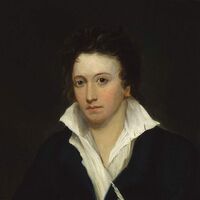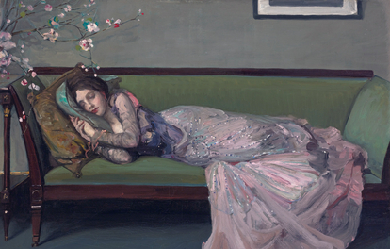Julian and Maddalo
(excerpt)
I rode one evening with Count Maddalo
Upon the bank of land which breaks the flow
Of Adria towards Venice: a bare strand
Of hillocks, heap’d from ever—shifting sand,
Matted with thistles and amphibious weeds,
Such as from earth’s embrace the salt ooze breeds,
Is this; an uninhabited sea—side,
Which the lone fisher, when his nets are dried,
Abandons; and no other object breaks
The waste, but one dwarf tree and some few stakes
Broken and unrepair’d, and the tide makes
A narrow space of level sand thereon,
Where 'twas our wont to ride while day went down.
This ride was my delight. I love all waste
And solitary places; where we taste
The pleasure of believing what we see
Is boundless, as we wish our souls to be:
And such was this wide ocean, and this shore
More barren than its billows; and yet more
Than all, with a remember’d friend I love
To ride as then I rode; for the winds drove
The living spray along the sunny air
Into our faces; the blue heavens were bare,
Stripp’d to their depths by the awakening north;
And, from the waves, sound like delight broke forth
Harmonizing with solitude, and sent
Into our hearts aëreal merriment.
So, as we rode, we talk’d; and the swift thought,
Winging itself with laughter, linger’d not,
But flew from brain to brain—such glee was ours,
Charg’d with light memories of remember’d hours,
None slow enough for sadness: till we came
Homeward, which always makes the spirit tame.
This day had been cheerful but cold, and now
The sun was sinking, and the wind also.
Our talk grew somewhat serious, as may be
Talk interrupted with such raillery
As mocks itself, because it cannot scorn
The thoughts it would extinguish: 'twas forlorn,
Yet pleasing, such as once, so poets tell,
The devils held within the dales of Hell
Concerning God, freewill and destiny:
Of all that earth has been or yet may be,
All that vain men imagine or believe,
Or hope can paint or suffering may achieve,
We descanted, and I (for ever still
Is it not wise to make the best of ill?)
Argu’d against despondency, but pride
Made my companion take the darker side.
The sense that he was greater than his kind
Had struck, methinks, his eagle spirit blind
By gazing on its own exceeding light.
Meanwhile the sun paus’d ere it should alight,
Over the horizon of the mountains—Oh,
How beautiful is sunset, when the glow
Of Heaven descends upon a land like thee,
Thou Paradise of exiles, Italy!
Thy mountains, seas, and vineyards, and the towers
Of cities they encircle! It was ours
To stand on thee, beholding it: and then,
Just where we had dismounted, the Count’s men
Were waiting for us with the gondola.
As those who pause on some delightful way
Though bent on pleasant pilgrimage, we stood
Looking upon the evening, and the flood
Which lay between the city and the shore,
Pav’d with the image of the sky.... The hoar
And aëry Alps towards the North appear’d
Through mist, an heaven—sustaining bulwark rear’d
Between the East and West; and half the sky
Was roof’d with clouds of rich emblazonry
Dark purple at the zenith, which still grew
Down the steep West into a wondrous hue
Brighter than burning gold, even to the rent
Where the swift sun yet paus’d in his descent
Among the many—folded hills: they were
Those famous Euganean hills, which bear,
As seen from Lido thro’ the harbour piles,
The likeness of a clump of peakèd isles—
And then—as if the Earth and Sea had been
Dissolv’d into one lake of fire, were seen
Those mountains towering as from waves of flame
Around the vaporous sun, from which there came
The inmost purple spirit of light, and made
Their very peaks transparent. “Ere it fade,”
Said my companion, “I will show you soon
A better station”—so, o’er the lagune
We glided; and from that funereal bark
I lean’d, and saw the city, and could mark
How from their many isles, in evening’s gleam,
Its temples and its palaces did seem
Like fabrics of enchantment pil’d to Heaven.
I was about to speak, when—"We are even
Now at the point I meant," said Maddalo,
And bade the gondolieri cease to row.
“Look, Julian, on the west, and listen well
If you hear not a deep and heavy bell.”
I look’d, and saw between us and the sun
A building on an island; such a one
As age to age might add, for uses vile,
A windowless, deform’d and dreary pile;
And on the top an open tower, where hung
A bell, which in the radiance sway’d and swung;
We could just hear its hoarse and iron tongue:
The broad sun sunk behind it, and it toll’d
In strong and black relief. “What we behold
Shall be the madhouse and its belfry tower,”
Said Maddalo, “and ever at this hour
Those who may cross the water, hear that bell
Which calls the maniacs, each one from his cell,
To vespers.” “As much skill as need to pray
In thanks or hope for their dark lot have they
To their stern Maker,” I replied. “O ho!
You talk as in years past,” said Maddalo.
“ 'Tis strange men change not. You were ever still
Among Christ’s flock a perilous infidel,
A wolf for the meek lambs—if you can’t swim
Beware of Providence.” I look’d on him,
But the gay smile had faded in his eye.
“And such,” he cried, “is our mortality,
And this must be the emblem and the sign
Of what should be eternal and divine!
And like that black and dreary bell, the soul,
Hung in a heaven—illumin’d tower, must toll
Our thoughts and our desires to meet below
Round the rent heart and pray—as madmen do
For what? they know not—till the night of death,
As sunset that strange vision, severeth
Our memory from itself, and us from all
We sought and yet were baffled.” I recall
The sense of what he said, although I mar
The force of his expressions. The broad star
Of day meanwhile had sunk behind the hill,
And the black bell became invisible,
And the red tower look’d gray, and all between
The churches, ships and palaces were seen
Huddled in gloom;—into the purple sea
The orange hues of heaven sunk silently.
We hardly spoke, and soon the gondola
Convey’d me to my lodgings by the way.
The following morn was rainy, cold and dim:
Ere Maddalo arose, I call’d on him,
And whilst I waited with his child I play’d;
A lovelier toy sweet Nature never made,
A serious, subtle, wild, yet gentle being,
Graceful without design and unforeseeing,
With eyes—Oh speak not of her eyes!—which seem
Twin mirrors of Italian Heaven, yet gleam
With such deep meaning, as we never see
But in the human countenance: with me
She was a special favourite: I had nurs’d
Her fine and feeble limbs when she came first
To this bleak world; and she yet seem’d to know
On second sight her ancient playfellow,
Less chang’d than she was by six months or so;
For after her first shyness was worn out
We sate there, rolling billiard balls about,
When the Count enter’d. Salutations past—
“The word you spoke last night might well have cast
A darkness on my spirit—if man be
The passive thing you say, I should not see
Much harm in the religions and old saws
(Though I may never own such leaden laws)
Which break a teachless nature to the yoke:
Mine is another faith”—thus much I spoke
And noting he replied not, added: “See
This lovely child, blithe, innocent and free;
She spends a happy time with little care,
While we to such sick thoughts subjected are
As came on you last night. It is our will
That thus enchains us to permitted ill.
We might be otherwise. We might be all
We dream of happy, high, majestical.
Where is the love, beauty, and truth we seek
But in our mind? and if we were not weak
Should we be less in deed than in desire?”
“Ay, if we were not weak—and we aspire
How vainly to be strong!” said Maddalo:
“You talk Utopia.” “It remains to know,”
I then rejoin’d, “and those who try may find
How strong the chains are which our spirit bind;
Brittle perchance as straw.... We are assur’d
Much may be conquer’d, much may be endur’d,
Of what degrades and crushes us. We know
That we have power over ourselves to do
And suffer—what, we know not till we try;
But something nobler than to live and die:
So taught those kings of old philosophy
Who reign’d, before Religion made men blind;
And those who suffer with their suffering kind
Yet feel their faith, religion.” “My dear friend,”
Said Maddalo, “my judgement will not bend
To your opinion, though I think you might
Make such a system refutation—tight
As far as words go. I knew one like you
Who to this city came some months ago,
With whom I argu’d in this sort, and he
Is now gone mad—and so he answer’d me—
Poor fellow! but if you would like to go
We’ll visit him, and his wild talk will show
How vain are such aspiring theories.”
“I hope to prove the induction otherwise,
And that a want of that true theory, still,
Which seeks a 'soul of goodness’ in things ill
Or in himself or others, has thus bow’d
His being. There are some by nature proud,
Who patient in all else demand but this—
To love and be belov’d with gentleness;
And being scorn’d, what wonder if they die
Some living death? this is not destiny
But man’s own wilful ill.”0
As thus I spoke
Servants announc’d the gondola, and we
Through the fast—falling rain and high—wrought sea
Sail’d to the island where the madhouse stands.


